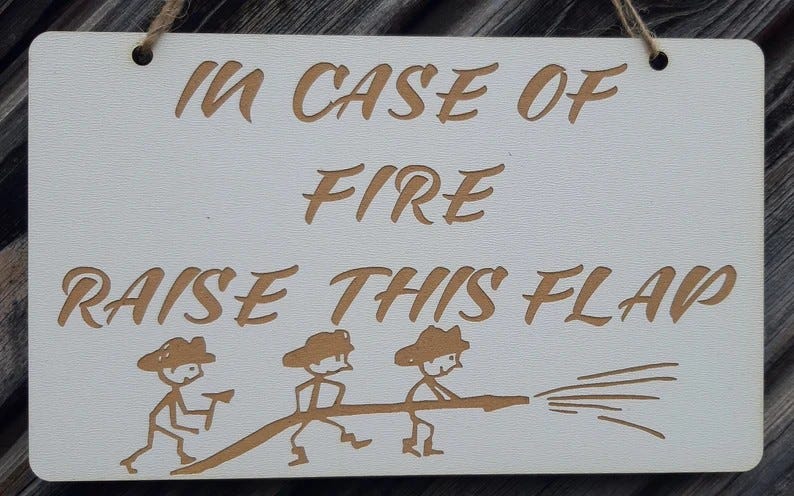What the world owes us
Huh?
My grandmother was a petite, proper woman, with a firm sense of the way things ought to be. But mischief occasionally winked from behind the propriety. On the wall of her kitchen hung a wooden signboard the size of a notepad, with a flap that hung down in front. On the flap were the words “In case of fire, raise this flap.” Guests naturally raised the flap. “Not now, stupid. In case of fire.” they read.
Another wall had a placard with a bold assertion in manifesto font: “The world owes you a living.” In small print beneath: “But you have to work hard to collect it.”
Until a few hundred years ago, a claim that the world owed anyone anything would have been preposterous, even bizarre. But Enlightenment figures like Thomas Jefferson said, in essence, that the world owes people life, liberty and the pursuit of happiness. James Madison didn’t exactly insist that the world owed people free speech, freedom of religion, the right to bear arms and to jury trials, and so on; but by forbidding Congress to impair those freedoms and rights he invited his successors to treat them as Americans’ patrimony. Social Security, Medicare and other support programs were novelties when first created in America but quickly became “entitlements.” The 1948 United Nations Universal Declaration of Human Rights added freedom of movement, the right to marry, the right to property and to access to public services, the right to equal pay for equal work, the right to paid vacations and the right to enjoy the arts to the list of what people are owed simply by being humans.
Some of the declarations of the world’s debt to individuals employ sleight-of-hand on the part of the drafters. What they really mean is that individuals must not be selectively deprived of these rights by governments. The right to marry, for example, didn’t promise that every Jack would find his Jill. But the prestidigitation was deliberate, and it was easy for scanners of the UN declaration—it’s quite long, making Madison’s Bill of Rights appear a Post-it by comparison—to think the world really owed them all those good things. If they didn’t get them, they were being deprived.
The logic behind this rested on the concept of equality, which experienced comparable mission creep. Blame Jefferson again. Instead of declaring all men “equally free and independent,” as his friend George Mason did in Virginia’s Declaration of Rights, Jefferson asserted that “all men are created equal.” Mason’s formula was clearly set in politics, but Jefferson’s lacked any such anchor and in time wafted into many other realms of human existence.
It entered the American Constitution via the Fourteenth Amendment, which promised “equal protection of the laws” to all Americans. In 1868, when the amendment was adopted, such protection was mostly negative. Formerly slave states must not deprive black people of rights enjoyed by whites, as recently enacted “black codes” demonstrated they were likely to do.
But during the twentieth century, when New Deal and Great Society programs made government a more positive presence in Americans’ lives, equal protection came to mean that whatever anyone got, everyone must get. This was a perfectly legitimate interpretation, as long as it involved government programs.
But it leaped the fence into perceptions of life in general. When new programs were being proposed, they were often defended on grounds that in a country as rich as the United States, no person should go without an old-age pension, health care, access to clean air and water, or whatever the new programs envisioned. Again, this is defensible as a policy position. But in the heat of politics it often is recast as a matter of right: Americans have a right to health insurance or pre-K education or forgiveness of student debt. They are owed these things. And as the example of the UN Declaration of Rights demonstrates, if people in rich countries are owed these things, then people in all countries are too.
The UN declaration reveals the folly of this approach. By promising far more than it can deliver in the way of positive rights—paid vacations?!—which have to be paid for, it undermines the legitimacy of the negative rights, which don't. If a government can't afford universal health care, why should it bother about free speech?
My grandmother had a much better approach. She was a practical woman, a daughter of the Great Depression. Airy talk of what the world owed people was lost on her. To silence the theorists, she was willing to grant that the world owed people a living. But it was up to those people—including her grandchildren—to work hard to collect it.
Good advice for anyone.


"The right to marry, for example, didn’t promise that every Jack would find his Jill." As a retired English prof, I love Brands' way with words. The Jack and Jill quote reminds me of the naughty parodies of Mother Goose rhymes we teenage boys had way back then. (I'll spare my readers and not give examples.)
As usual, a great essay by Dr. Brands. I love the story about his grandmother and it reminded me of one of my grandmothers. Don't get me wrong! I loved all my grandparents equally, but one grandmother was a character (in the positive sense of the word). Speaking generally, some country philosopher once said "Grandparents are nicer than parents. They love you as much as your parents do, but they don't spank you when you're bad."